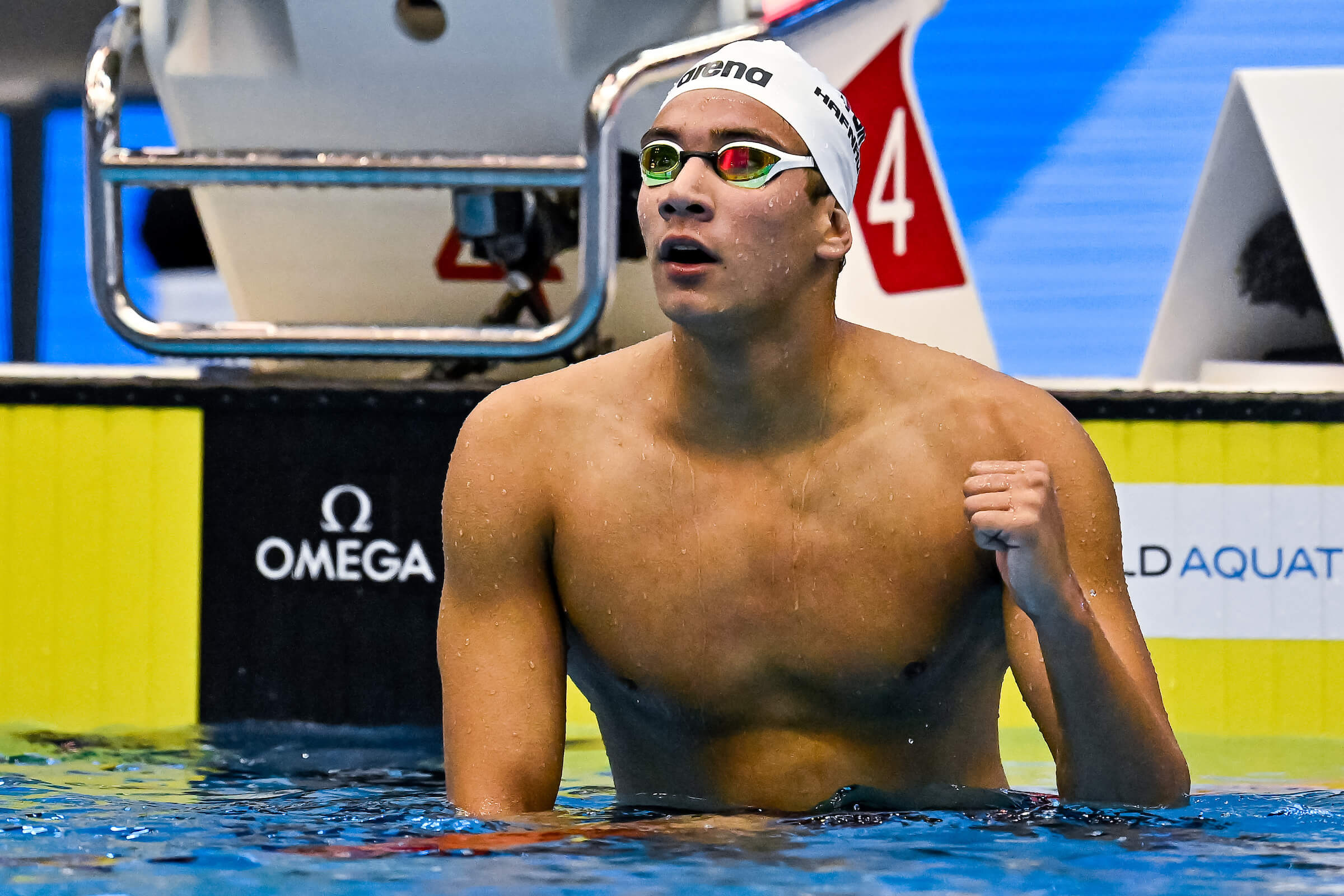The Chase for 3:39: Can Sam Short, Ahmed Hafnaoui Finally Reach Elusive Barrier in 400 Freestyle?

The Chase for 3:39: Can Sam Short, Ahmed Hafnaoui Finally Reach Elusive Barrier in 400 Freestyle?
That evening in 2002, men were on the verge of swimming under three minutes, 40 seconds in the 400 freestyle. At the 2002 Commonwealth Games, Ian Thorpe, 19, had just lowered the world record for the fifth time, getting down to 3:40.08, so the dipping under that lofty barrier appeared inevitable. But as it turned out, Thorpe would never dip under the global standard again, and the mark would only drop by one hundredth over the next 21 years.
Yes, Thorpe’s record would still be standing if not for Paul Biedermann, the big German who was never a contender over 400 meters except for when full-polyurethane suits were legalized in 2009. Swimming in the Worlds final that year, a surreal final length helped Biedermann run down Thorpe’s record pace over the final length to finish in 3:40.07.
So now, for the last 14 years, Biedermann has been the one chased, not Thorpe, and the serious challenges to that record have been few. Most notably, China’s Sun Yang came within a tenth in his gold-medal swim at the 2012 Olympics, but he never improved upon that time of 3:40.14. For the bulk of the next decade, times of 3:41, sometimes slower, were adequate for gold medals. The gap between 3:40s was a whopping 11 years.
The slowest winning time in a major competition was at the Tokyo Olympics, the meet delayed one year by the COVID-19 pandemic and held after Sun, winner of four consecutive world titles at that point, had been banished from the sport for doping violations. In Tokyo, Tunisian teenager Ahmed Hafnaoui stunned the field from lane eight, out-dueling Australia’s Jack McLoughlin to win gold in 3:43.36.

Tunisia’s Ahmed Hafnaoui — Photo Courtesy: Andrea Masini / Deepbluemedia / Insidefoto
One year later, Hafnaoui was absent from the World Championships, but speed over eight laps had picked up. Germany’s Lukas Martens set the standard by reaching the 3:41s early in the year, and he led with 50 meters remaining in the World Championships final, but Australia’s Elijah Winnington turned on the jets on the last length to reach the wall for gold in 3:41.22. No man had been that fast since the London Olympics.
The progress of the event would not stop there. The next stop was 3:40s, and that would happen in 2023. Neither of the men responsible were favorites, but they were not exactly off-the-radar names, either. One was Hafnaoui, back in major competition, quickly affirming his reputation as a big-name racer. Hafnaoui, now 20, was joined atop the standings by Sam Short, a 19-year-old Australian who had played second fiddle to Winnington at the 2022 Commonwealth Games but was now ascendant. Indeed, prelims at the World Championships saw Short challenge the world record and pace the field by 1.70 seconds.
At night, Short set the pace, out-pacing Biedermann’s world record from the start and reaching a speed 1.72 seconds under record pace by the halfway point. But Hafnaoui never yielded. He stuck close to the Aussie and even briefly took the lead with 50 meters remaining, both men still more than six tenths quicker than Biedermann to that point. The suit-aided 25.77 finishing split was too much for either, but they flew to the wall with times in the 3:40-range, Short two hundredths clear in 3:40.68 while Hafnaoui’s 3:40.70 was a precursor to golden performances to come in the 800 and 1500.
Those times are the seventh and eighth-fastest performances in history, respectively, with only three men, Biedermann, Thorpe and Sun, ranking quicker. Could they find just a bit more and reach the 3:39 territory anxiously awaited for so long?
Biedermann, Thorpe and Sun all came so close. The suit ban hampered Biedermann’s ability to return to his best time, but no such change affected Thorpe or Sun. It just never happened for them. Short and Hafnaoui have youth on their side, but so did Thorpe, with his last world record coming at age 19.
The world will watch over the next year leading into the Paris Olympics and even beyond as these two men lead the charge for 3:39. Once again, those digits are in range, with Short and Hafnaoui each possessing the speed-endurance combination required to have a chance. After more than two decades of staring at a 3:40.0 world record, the swimming community would surely marvel if one man or more can get over the hump.



